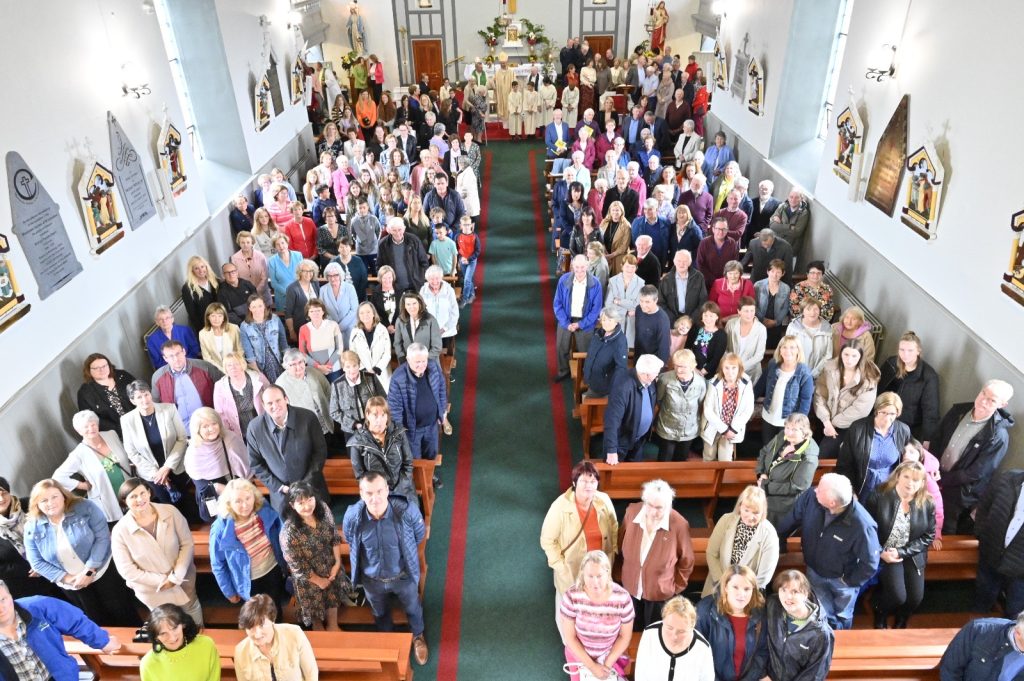Senior members of our communities sometimes enjoy reflecting on the changes that he or she has seen in the course of their lifetime. Instant communications, full employment, motorways, affordable air travel, changes in farming and the European Union are often listed. Sometimes they include changes in the world of faith and religion. Memories of Mass celebrated in Latin, benediction, full churches, priests in every community, people waiting in line for confession, men and women sitting at different sides of the church, devotions and rounds at holy wells often feature among their memories. Often people have mixed feelings about the changes in faith and practise that they have seen. Many wish that their children and grandchildren would derive greater joy and meaning from faith and spirituality. Alongside that, there is universal gratitude that the hand of the church does not lean so heavily on people today as in the past. The motto that Bishop Willie Walsh choose in 1994 for his ministry still resonates with people. We place our faith in Cineáltas Chríost – The Gentleness of Christ.
What about the future? What memories will people have regarding faith and spirituality in a few decades time? Obviously, we don’t know. Society and culture often evolve in unpredictable ways. We can speculate that if present trends continue then Ireland will resemble many mainland European countries and become almost entirely secular. However, we are people of faith who place our trust in the Holy Spirit. What can people who treasure the faith do to help keep the flame alight?
The dominant pastoral approach in Ireland today centres on promoting ministry based on baptism and ever-increasing co-operation between faith communities. The great majority of Irish people still have some link with the faith. It is difficult to play an active role in community life without occasionally visiting a church for a funeral, months mind Mass, first Holy Communion or confirmation. Most parents present their children for baptism and the other sacraments of initiation. On the other side of the coin, fewer couples opt for a sacramental marriage and secular funerals are growing in popularity. Sunday Mass is much less of a community celebration than in the past and not many people avail of the sacrament of reconciliation. Few choose the priesthood or religious life.
A major innovation in our diocese since the pandemic had been the commissioning of volunteer pastoral ministers. They are lay people who have completed a programme of formation and now minister in areas such as funeral ministry or helping families prepare for first Holy Communion or confirmation. Lay people fulfilling these roles would have been unimaginable only a decade ago. Increasingly our volunteer ministers lead community Sunday prayer in the growing number of churches where there is no longer a priest available to celebrate Mass every week. We are also rapidly moving from a system of pastoral care based on individual parishes to focus on groups of parishes known as pastoral areas.
Pope Francis continually reminds us that we are living through a time of fundamental change. If we wish to keep flame of faith alive in our hearts and communities we need to reflect, discern and act together. The structures that we created in an era of almost 100% engagement in the life of the Church, numerous vocations to the priesthood and religious life and minimal state regulation no longer serve our needs today. The willingness of lay people to volunteer as pastoral ministers and their acceptance by our faith communities are reasons to be hopeful. The contribution made by priests from abroad who minister in our diocese is also to be treasured.
Friendship with Christ is everything. Apart from it, nothing makes sense. Faith bridges the gap between life and hope. Thankfully, the community pressure that once pushed people to engage in Church life is gone. Today, only people who truly value faith and spirituality will engage in the life of their faith community.
Faith is born of a hand extended in welcome. It is an invitation offered and accepted. The hand of Christ reaches out to us in various and many forms. We are living in a changed epoch. As Pope Francis puts it ‘If we want things to stay as they are, things will have to change.’ If our friendship with the Christ of gentleness is to endure and attract, then a great deal will have to change. Pope Francis is leading a search for new ways of expressing, living and sharing our faith so that it may remain alive in our hearts and be visible in our words and actions. Hopefully, our time will be remembered as a season of renewal when faith began to speak to us in a new and vibrant way.
Fr. Albert McDonnell
Radharc na nOileán pastoral area.
